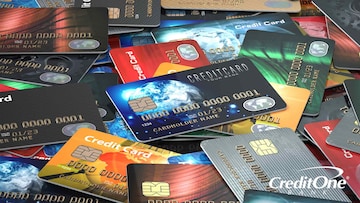March 14, 2022
Topics:
Credit CardLots of good things can happen when you turn 16. Getting a credit card could be one of them—by becoming an authorized user on someone else’s account.

In this article:
- Are There Credit Cards You Can Get at 16?
- At What Age Can You Get a Credit Card?
- How Does Becoming an Authorized User Affect an Authorized User’s Credit?
- Other Options Besides Credit Cards for 16-Year-Olds
- The Upsides and Downsides of a 16-Year-Old Getting a Credit Card
- The Importance of Understanding How Credit Cards Work Before Getting One
- Should a 16-Year-Old Get a Credit Card?
Learning to manage credit at a younger age is a skill that could pay dividends later in life. Your credit score doesn’t just affect your ability to be approved for future credit, which could be used to purchase a home or car or be approved for a credit card, it could also play a role in the job you get, the apartment you rent, and even the auto insurance premiums you pay down the road.
Responsible use of a credit card can go a long way toward building a positive credit history, a major factor used in calculating credit scores. But is it even possible for a 16-year-old to get a credit card of their own?
If getting a credit card of your own is one of the items on your “sweet sixteen” list of things to do, read on to learn what your options are.
Are There Credit Cards You Can Get at 16?
The simple answer to this question is, no, you cannot legally open a credit card of your own at the age of 16. Your only real path to a credit card at this age is to become an authorized user on someone else’s credit card account. A parent is probably your best bet, but any adult (over age 21) with a credit card account that’s in good standing and allows authorized users can add you as an authorized user—it doesn’t have to be a relative.
If you’re added as an authorized user to another account, you will be issued a credit card of your own, with your name on it. It will not, however, be your account. It remains the account of the primary cardholder, but you enjoy many of the same privileges they do.
The main privilege you enjoy is the ability to use your issued credit card to make purchases, the same as the primary cardholder. You are not, however, allowed to make any changes to the account, such as requesting a credit line increase or closing the account; these are actions reserved for the primary cardholder.
An authorized user is also not legally responsible for paying back any of the charges they make with the credit card—the primary cardholder is 100 percent liable for every purchase made with the card, both theirs and yours. But, if you made an agreement with the primary cardholder to pay them back for your purchases, you’re probably going to want to reimburse them for your purchases if you wish to stay an authorized user on the account.
If you’re 16 years old, you should be old enough to meet the minimum age requirement to be added as an authorized user on a credit card account that allows authorized users. In fact, some card issuers have no minimum age requirements because, legally, there is no minimum age requirement for being an authorized user. That’s because an authorized user isn’t technically entering into a contract with a credit card issuer; the primary cardholder is merely granting them, a third-party, purchasing privilege.
At What Age Can You Get a Credit Card?
The minimum age at which you can get a credit card of your own in the U.S. is 18. However, the Credit CARD Act of 2009 requires a card applicant who is not yet 21 to provide proof that their income is sufficient to repay any credit card debt they may incur. If such proof cannot be provided, then an applicant over the age of 18 but not yet 21 can only open a credit card of their own if there is a cosigner who is 21 or older on the account.
To make it even more difficult for 18-, 19-, and 20-year-olds to get a credit card, the majority of card issuers don’t allow cosigners. Which means, unless you’re independently wealthy or have a reliable source of income during these tweener ages, chances are you won’t be approved for a credit card of your own until you turn 21.
How Does Becoming an Authorized User Affect an Authorized User’s Credit?
Becoming an authorized user on someone else’s account could affect your credit, depending on the card issuer and their policies on reporting account activity to the three major consumer credit bureaus. Some card issuers report account activity to one or more of the credit bureaus for both the primary cardholder and the authorized user. If this is the case, then becoming an authorized user on someone else’s account at 16 could not only be a good way to get a credit card of your own; it could also help you start building a credit history at a young age.
But here’s a caveat—all activity from both parties will be reported and reflected in both parties’ credit reports, good and bad. So, you only want to be added as an authorized user to the account of someone who has good credit; makes consistent, on-time payments; and manages the account responsibly. Otherwise, your credit report(s) could reflect a negative credit history before you’re even old enough to apply for a credit card of your own.
Not all credit card issuers report account activity to appear in the credit reports of both parties. Credit One Bank, for example, only reports account activity to appear in an authorized user’s credit report(s) if the authorized user is also the primary cardholder’s spouse.
Other Options Besides Credit Cards for 16-Year-Olds
If the main reason you want a credit card at 16 is so you don’t have to carry cash, there are other options, including:
- A Debit Card: A debit card is connected to a bank account, so as long as there is enough money in that account to cover a purchase you want to make, you can use a debit card as a substitute for cash. A debit card, like a credit card, also offers better protection against loss, theft, and fraud than cash.
- A Gift Card: If you received a gift card as a present, you can make purchases with the card. The gift card is as good as cash with the retailer or retailers that honor the card.
- Prepaid Cards: These are cards you buy from specific merchants and load with a specified amount of money. Unlike a gift card, which is essentially worthless after its balance is used up, you can typically reload a prepaid card.
While all three of these are convenient cash-less options, none of them helps you build a credit history. Only becoming an authorized user on someone else’s account—if the card issuer reports account activity so it is reflected in the credit reports of both parties—will help with that.
The Upsides and Downsides of a 16-Year-Old Getting a Credit Card
There are several upsides to getting a credit card at 16, including:
- It could help you build a positive credit history. This is only a possibility if the credit card issuer reports account activity so it appears in the authorized user’s credit report(s), and only if the activity on the account is positive.
- It provides purchasing power for emergencies. Say that your car breaks down and you need an emergency tow. As a 16-year-old, you probably don’t carry enough cash to pay for an expensive tow, but a credit card should cover it.
- A credit card is more secure than cash. Lose cash, and it’s gone for good. Lose a credit card, and it’s replaced with a call. You’re also not responsible for more than $50 in unauthorized charges made with a credit card, and if your card offers Zero Fraud Protection, your liability is $0. Once cash is stolen, you’re paying for whatever the thief buys.
- A credit card could earn the primary cardholder rewards. If it’s a rewards credit card, you could earn them cash back rewards, points, travel miles, or more just for making purchases. It’s a nice way to say, “Thanks for making me an authorized user.” They may even share the rewards with you.
- A credit card may offer other perks. These perks could include extended warranties, purchase protection, travel insurance, or more, depending on the card.
There are really only two downsides to having a credit card at 16:
- It could result in a negative credit history. If you become an authorized user on an account riddled with missed payments, a high credit utilization ratio, or other results of poor credit management, you could build a negative credit history before you’re even old enough to apply for a credit card of your own.
- It is a MAJOR responsibility. A credit card is not free, instant money. If you’re an authorized user and use the card to purchase more than you can afford to pay back, that means the primary cardholder is obligated to pay it back. If they can’t, it could result in substantial interest charges, fees, penalties, and result in missed payments, which could harm their credit. Yours, too, if account activity is being reflected in your credit reports as well. So, if you’re not ready for the responsibility having a credit card entails, wait until you are.
The Importance of Understanding How Credit Cards Work Before Getting One
Just like you wouldn’t get behind the wheel of a car with no understanding of how one works, you don’t want to just grab a credit card and start spending. It’s important to understand how credit cards work; how credit reporting works; how credit scores are calculated; the difference between credit scores, credit reports, and credit bureaus; and the role credit can play in your life—both now and in the future.
This is far too much information to cover in this article, but these topics, and more, are covered here at Credit One Central, your online resource for all things credit. We encourage you to browse and learn more about these topics or any other credit-related topics that interest you. Then, start exercising the things you’ve learned with your credit card and develop good credit behavior and habits right out of the gate. They should follow you for the rest of your life.
Should a 16-Year-Old Get a Credit Card?
This is a question only you—and your parents or whoever the primary cardholder might be—can answer. If you’ve demonstrated that you’re a reliable person who can be trusted to behave responsibly, then having a credit card might make good sense. Or, if it’s important to you to start building a positive credit history at a young age, then becoming an authorized user on someone else’s account is the only real way to do so.
On the other hand, if you’re not ready for the responsibilities of having a credit card—and the potential harm it could cause to the primary cardholder’s credit if you use the card irresponsibly—then it’s probably best to wait until you’ve matured and are ready for a credit card of your own. If you have your own independent source of income, that could only be two years away, when you turn 18. If not, you may have to wait until you turn 21.
With his eyes set on becoming the next great ad man (at least until his comedy writing career took off), Marc earned his journalism degree and went straight into advertising for various gaming and tourism clients. He later expanded his credentials to include public affairs and communications work for several environmental science organizations before returning to his marketing roots. A lifelong scholar with recent studies in strategic communication, Marc enjoys tying humor into his writing and simplifying complex financial subjects into engaging and easy-to-digest content for a wide variety of audiences.



